Average Home Inspection Cost In The U.S.
Every year, we survey hundreds of home inspection firms in every state across the US to track the average cost of a home inspection. Not that price alone is always the best deciding factor to use when choosing a home inspector (read more on this below) but it’s useful to know what to expect when ordering a home inspection.
If however you’ve come here looking for a home inspection cost calculator to turn your inspection report into a repair estimate then head on over to our homepage for instructions on a fast, easy way to do that.
Still reading this? Then that means you’ve probably been asking yourself “How much does a home inspection cost?” and read a lot of articles and posts out there that claim to show you the average home inspection cost in the US today.
Which is great. Except you’re probably not buying the average house in the average area of the average age and average square footage. So we’ve gone even further and broken down our pricing survey by not only average cost in each state, but also by size of home, and also prevalence and cost of additional services like termite, radon and sewer inspection services.
So here it is – the average cost of a home inspection as actually quoted by REAL US Home Inspectors.
Based on our survey, for the average 3 bed, 2 bath US Home of 2400 sf, (with no additional services) you should expect to pay around $450 for a home inspection.
You will also see a second graph that shows the high, low and average cost for typical add on services you will find offered on inspections in your area.
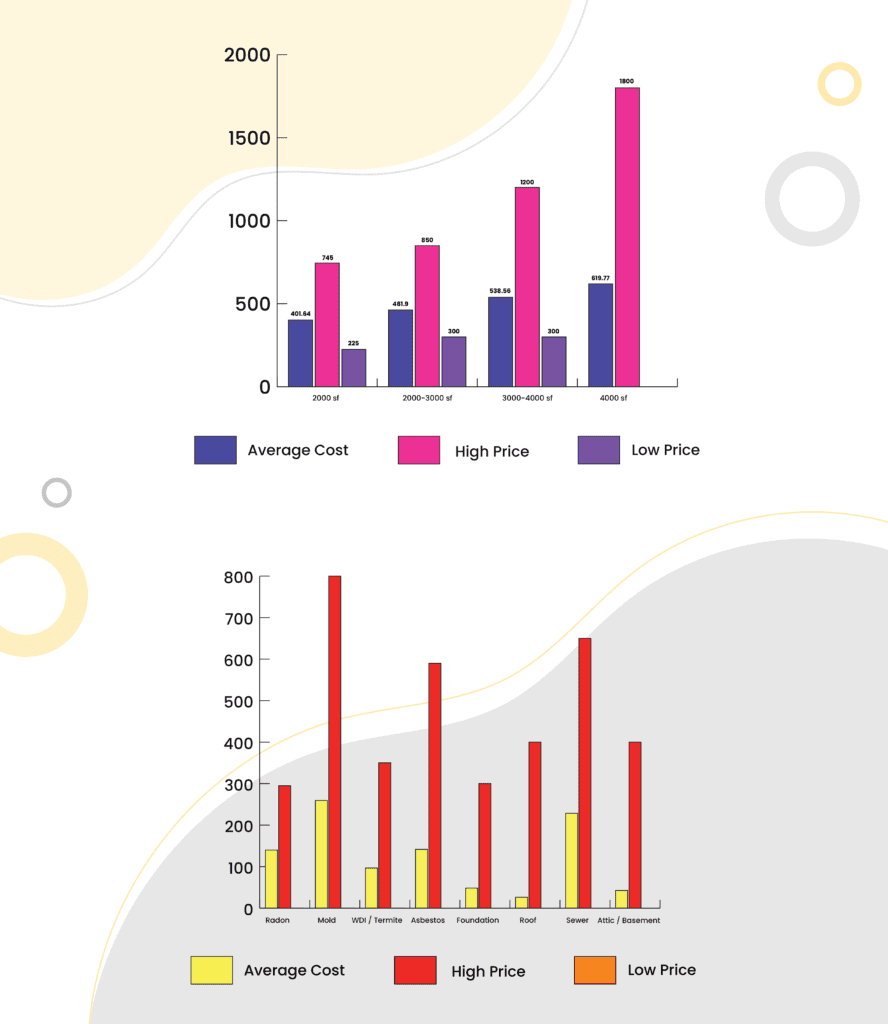
And here’s an actual breakdown of data from our survey (rounded to two decimal places.)

But how does that differ by State? Not surprisingly the North East ranks up there with four of the top 5 states with the highest average cost of home inspection (and cost of living) followed closely by the West Coast.
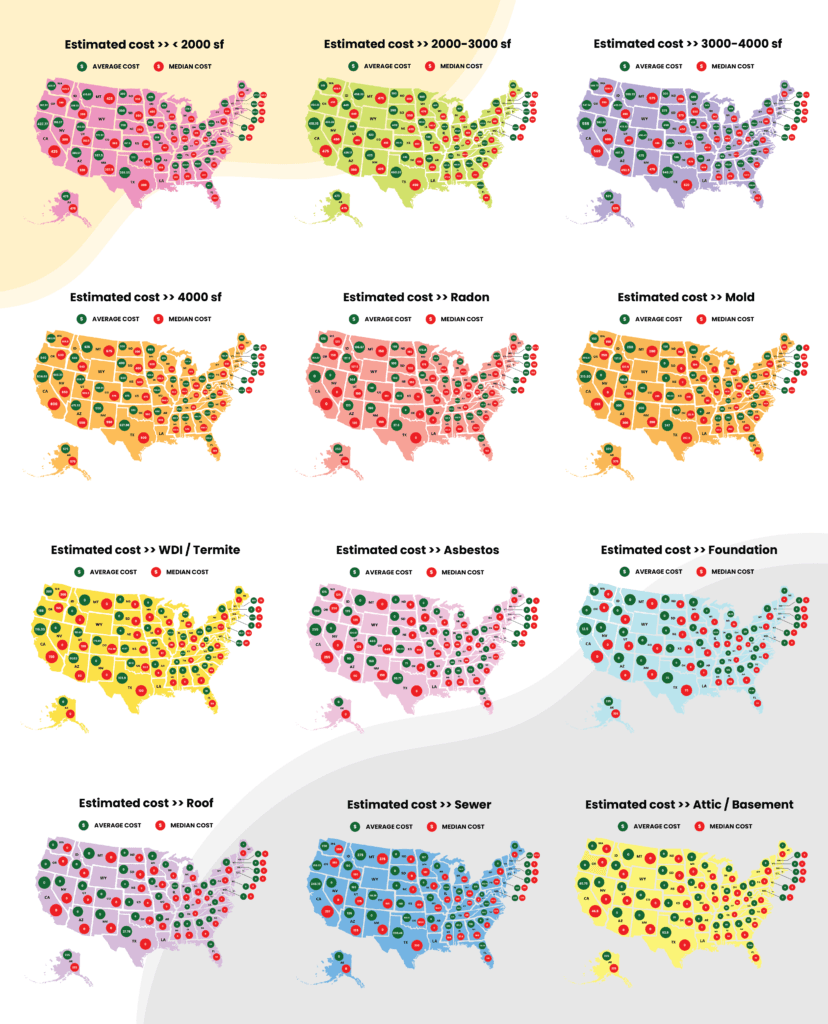
To download the full study, please fill out the form below.
Choosing The Right Home Inspector
So what does this mean if you’re looking for a home inspector?
Well, if you’re here hoping I’m going to tell you to go for the cheapest, $200 inspector you could find, I’m sorry but you’ve come to the wrong place.
If you’ve read our study on over 50,000 homes that looked at the most common home inspection repairs found in home inspections today, you’ll see that the average home required over $11,000 in repairs. So how much could saving money on a home inspection REALLY end up costing you?
See the table below for the top 10 most common repair costs based on our most recent study.
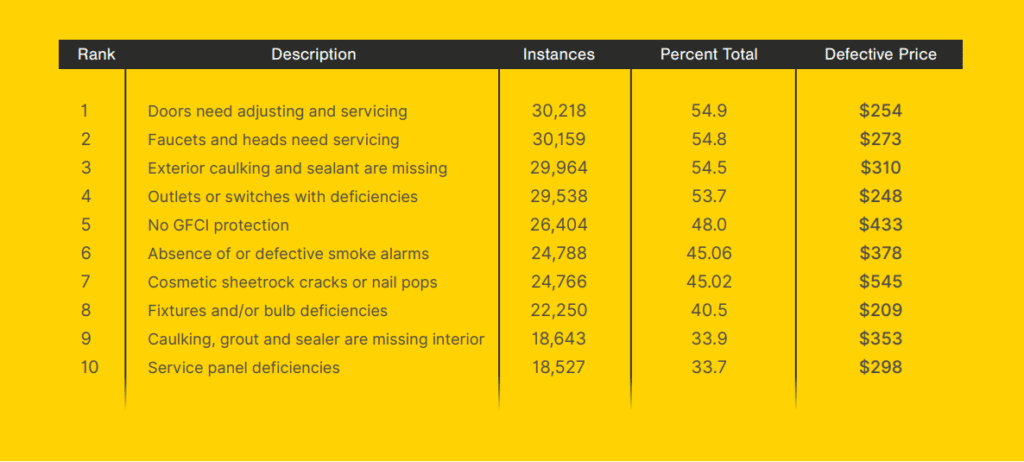
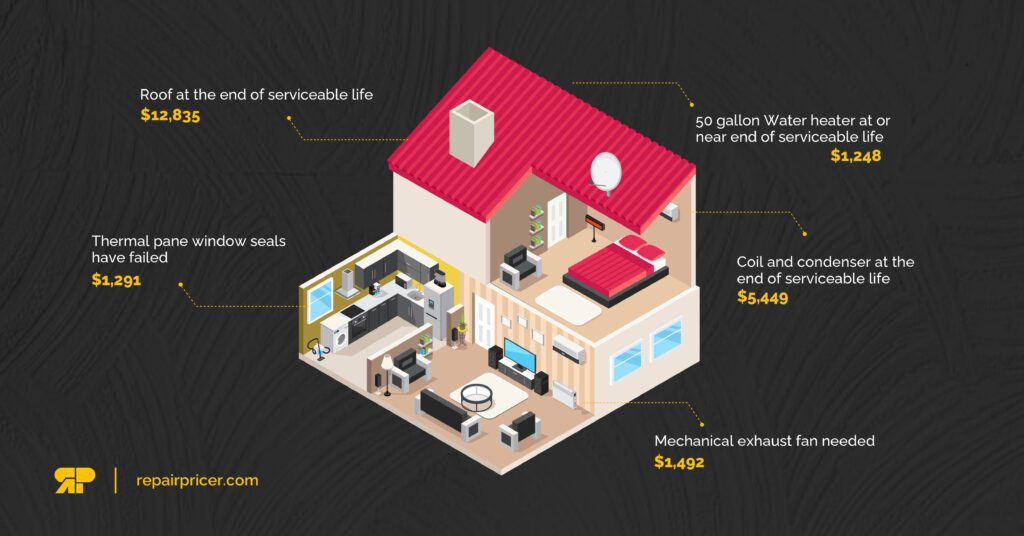
This means that if you hire the cheapest (and probably least experienced) home inspector you can find, statistically there’s a higher probability they’re going to miss something.
And that something could end up costing you a LOT of time and money. Think weeks/months of stress and thousands of dollars in repairs.
So would you spend an extra $50 to save $5000? Of course you would.
It’s why you’re reading this, because what you probably really want to know is “Is it worth it to get a more expensive home inspection?”
And my answer is categorically “Yes”.
But why should you care what I think?
Because I was a real estate broker for over 15 years, I’ve personally sold over 1200 homes, overseen $400 million in real estate transactions and I’m now the CEO of a company that has analyzed over 400,000 home inspections.
So please listen to me.
I have nothing to gain by sharing this information with you apart from hopefully making sure that at least one of you reading this doesn’t find themselves suddenly confronted with a horrible situation that could have been avoided.
For those of you who don’t know what we do at Repair Pricer – we analyze home inspection reports and then use those reports to create a highly accurate estimate of repairs. Basically the TRUE home inspection costs that you want.
We invented the practice, we’re the industry leader and we’re damn good at it. To see how it works click HERE.
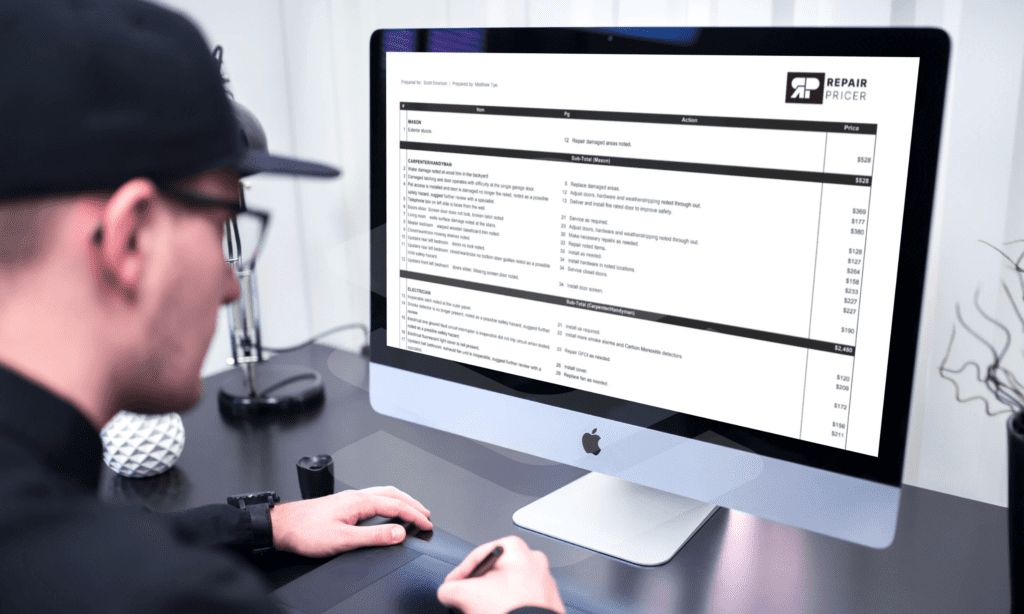
And because we understand that there are over 30,000 home inspectors out there using 200 different types of reporting software in 45,000+ ZIP codes, we built our system to be able to work on any inspection report no matter who wrote it.
But I’ll tell you something we tell our pricing experts when they’re confronted with a “BAD” inspection for the first time.
“We’re only as good as the inspector.”
What do I mean by this? I mean if they don’t have detailed pictures, explanations and comments on defects then our estimate is not going to be as accurate. And we’re honestly shocked by some of the reports we see.
What’s crazy is that the price difference between a “good” inspector and a “bad” inspector is probably only a couple of hundred dollars.
And you wouldn’t cancel your sales contract because you and the seller are off by a few hundred dollars. If the house was $450,200 instead of $450,000 you’d still buy it right?
So let me ask you this, how much did your mortgage appraisal cost? What about your title insurance? What about your county recording fees and your attorney fees?
I guarantee you they’re over $3000, yet you didn’t shop around for them did you? They were just presented to you on a term sheet and you went “seems fair” and signed it.
Well it doesn’t seem fair to me.
For some reason inspections are one of the few necessities in a real estate purchase that are not rolled into the price of the loan. Home inspection costs are normally paid upfront or at the time of inspection, and so are one of the few services you actually get to shop for.
I think that’s nuts.
I can’t tell you how many times I’ve seen buyers misled by unscrupulous sellers, agents and inspectors because they just want to make a quick buck and close the deal.
Don’t fall for it.
Which leads me to my next question.
Should You Hire Your Agent’s Recommended Home Inspectors?
And that’s a difficult question to answer. Because it REALLY depends on the agent and the inspector they recommend. How well do you know them? Do they have an amazing reputation? Were you referred to them or did you just find them on Zillow?
The same goes for the inspector. How are their Google, Facebook and Yelp reviews? Are they a InterNACHI certified?
If you haven’t already, we’d recommend reading our 7 Questions your Home Inspector doesn’t want you to ask article.
I’ll tell you that agents by default tend to favor professional, dependable inspectors who are not ALARMIST but who do a good and thorough inspection and don’t actually even consider the home inspection cost as a factor.
Then there are the cut throat bottom feeder agents who want a terrible inspector who won’t find anything wrong with the home so they can close the deal and collect their commission.
You just have to decide which one your agent is, and also make sure you do your due diligence on the inspector.
And yes you should consider the home inspection cost as a factor, but only AFTER you’ve looked at everything else. (Education/training, associations, designations, reviews, sample reports, ancillary services for your home, and overall value)
What To Consider When Choosing Your Home Inspector
TIP: If the home inspector doesn’t ask you for the size, location and age of the home before giving you a quote, walk away.
1. Older homes are more expensive
An older home is going to have more potential items that could be wrong with it, so an inspector is simply going to have to do more work and spend more time looking at it. They tend to have more “ wrong” with them also, so it’s going to take more time for the inspector to write up the report. Plus, only a really experienced inspector should be hired to take a look at truly historic homes, and should be asked up front “Have you inspected a home like this before?”.
2. Larger homes are more expensive
Again, time is money, and larger houses take longer to inspect and investigate. I think interestingly however if you look at the ratio between the cost of the home and the cost of the inspection there is actually an inverse relationship and you pay a LOWER price per sq/ft when you’re buying a larger home. So spend the extra money because there’s more ground to cover and you’re actually getting a better deal than someone buying a smaller home.
And don’t forget you have your older, larger homes! Like the ones that started off as a 2 bedroom 1 bathroom home and are now a large 6 bedroom 9 bathroom home with additions that came on in several decades from the turn of 1900’s to today. This is going to take an educated, experienced, professional inspector who has the knowledge of such homes. Almost like the specialist doctor you would see if you had a heart condition. You would want the best cardiologist for this, not the best podiatrist.
3. Hard to access / remote homes are more expensive
If your inspector has to parachute into a remote wooded area and hike 23 miles to your home, trust me, they’re going to charge you more. Seriously though, the farther you are from civilization and the harder it is to get to, expect to pay some kind of premium or trip fee.
Extra home inspections
OK I understand that I may have to pay more for the home I’m buying but do I actually NEED any of the extras the inspector is recommending?
Again it depends, but I’ll cover the major ones below and let you decide.
Infrared Inspection
Personally I think this is some serious James Bond stuff and would recommend it just for the cool factor. But all that aside, opting to find a home inspector who offers infrared scanning, has GOOD equipment (very important) and knows how to use that equipment (also very important) is a great idea.
One of the main frustrations with a home inspection is you can’t start tearing the walls or roof off to see what’s really going on with the house as a home inspection is a non invasive examination of the home.. Some sneaky seller could have just painted over a recent leak (yes I’ve seen that done) and pretended like nothing was wrong.
But with an infrared camera (Like a FLIR or Fluke) you CAN see behind thermal anomalies on the walls. This helps you see leaks, moisture intrusion, heat loss, missing insulation, electrical issues, and all kinds of other cool stuff. So in my book, this is a definite must have inspection.
Sewer Scope
Oh man. Here’s a story for you.
I’d been living in my house in Austin, TX for about a year. I hadn’t had the sewer scoped during my inspection because I was an idiot, and my drains started backing up.
I’m a do it yourself guy so I grabbed a pipe snake and went to town. I found a BIG blockage about 20 feet down from the outside cleanout. So I measured it out and started digging.
Some jackass had planted a crape myrtle tree right over the sewer line and it had been slowly growing its roots right into the pipe. Until the roots got so thick that just my luck it got backed up and we had to get the whole line replaced.
$6000 of sewer line to be exact.
This was a long time before Repair Pricer and I count it as one of my turning points towards creating this company. Because it was so frustrating to know that for an extra $100 maybe I could have found out about this problem and let it be the seller’s fault.
But I didn’t. Lesson learned.
Get a sewer scope.
Should I get Radon Testing
Radon gas is nasty stuff, but this is VERY area specific. In most states, no Radon is not a concern.
However the top ten most commonly identified as having potential radon issues are:
- Alaska
- South Dakota
- Pennsylvania
- Ohio
- Washington
- Kentucky
- Montana
- Idaho
- Colorado
- Iowa
If you want to look it up by county you can use this handy map HERE
My take on this is if it’s a common concern in your area, get it tested. And make sure the seller doesn’t try and pull any sneaky tricks by moving/removing test equipment early. In fact ASK your inspector after the test if they have any reason to believe that the seller tampered with equipment.
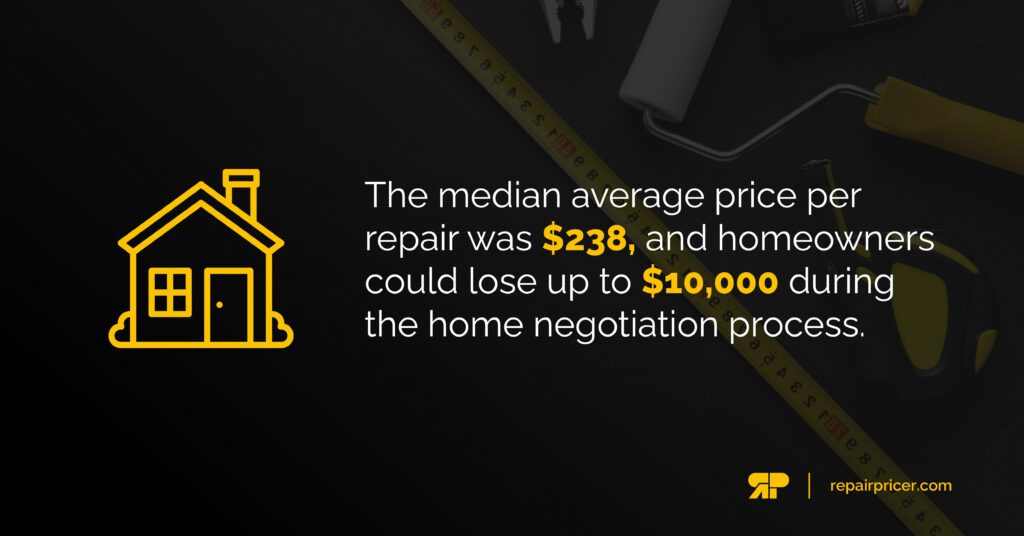
How To Get a Home Inspection
So now you know you want a quality inspection, you don’t mind paying a bit more, you know which extras you want and don’t want, but where do you start?
If you can find a well qualified, quality, experienced home inspector with a great reputation, who knows your area and can offer you all the extra services you need for a GREAT price, then absolutely hire them.
Not all cheaper inspectors are bad, and not all expensive inspectors are good.
Just don’t start with your price point.
Here’s how to get a home inspection:
1. I recommend going to this website:
https://www.nachi.org/certified-inspectors
The inspectors listed here have voluntarily undergone extra training, obtained extra certifications and pride themselves on being simply better inspectors to benefit their clients (YOU)! .
They are licensed in states that require licenses and hold themselves to a higher standard.
2. Pick your top 5 candidates, then, cross correlate the results you find there with Google and Yelp reviews. Inspectors with better/more reviews are normally well organized, have more experience and care about what their customers think.
Alternatively you could do it the other way around and start with well reviewed companies in your area first, then make sure they are certified by InterNACHI. Either way works.
3. Call the inspector and see what kind of customer service they offer. Do they pick up their phone? If not, do they call back when you leave a message? Can they answer all your questions and do they offer all the extras you want? If you have a “unique” home have they inspected anything like it before?
Remember, we’d recommend reading our 7 Questions your Home Inspector doesn’t want you to ask article before calling to get an idea of good questions.
THEN ask about price. Then make your decision.
Remember the average home costs over $300k, and an average home inspection cost is less than 0.1 % of your home’s value, yet can save you thousands in unknown repair costs. While your closing costs can amount to 2% of your total loan value, average over $6000 and basically do nothing for you. Which is the better deal?
You may find you just really hit it off with one company or inspector, but whatever your decision, just know that using this method should find the best option for you.
I hope this has been helpful, and maybe opened your eyes a bit to why price should not be the first consideration when choosing a home inspector.
And don’t forget to download our FREE home inspection checklist to help you review the inspection AFTER you receive it.
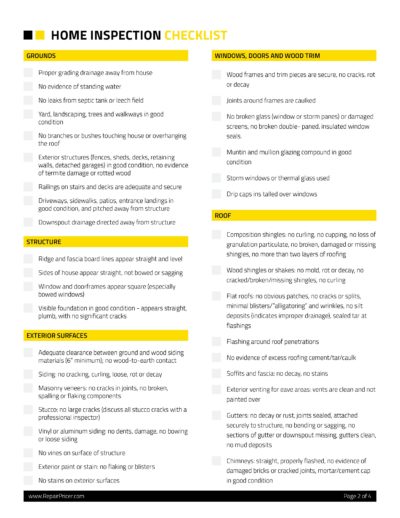
This simple document really helps you drill down to the important stuff and gives you an easy way to check that the inspector you ultimately chose did a full and thorough inspection on everything we recommend.
